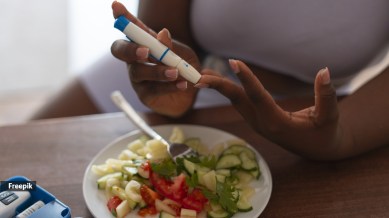📣 For more lifestyle news, click here to join our WhatsApp Channel and also follow us on Instagram
One large meal vs. multiple small meals: Does one work better than the other for managing blood sugar levels?
What approach truly supports diabetic health?

When it comes to managing blood sugar levels, what you eat matters, but so does how often you eat. For people with diabetes or those at risk, one common question is whether it’s better to consume one large meal a day or break food intake into smaller, more frequent meals.
Some suggest that spacing meals evenly across the day helps stabilise blood sugar, while others point to benefits of time-restricted eating or intermittent fasting, where fewer meals might lead to better insulin sensitivity. The debate continues, as many are wondering what approach truly supports diabetic health.
monthly limit of free stories.
with an Express account.
So, can eating smaller, more frequent meals help regulate blood sugar better than consuming one or two large meals a day?
Kanikka Malhotra, diabetes educator at Health Pepper, tells indianexpress.com, “Some diabetics may find that eating smaller, more frequent meals helps them maintain stable blood sugar levels and steady energy levels throughout the day. This strategy might lessen the likelihood of blood sugar crashes and spikes, particularly for people who feel hungry or unmotivated in between meals. There is no one ideal meal frequency, though; some research indicates that for some people with type 2 diabetes, eating two larger meals (such as breakfast and lunch) can be just as effective — if not more so — for glycaemic control.”
She adds that the secret is consistency; eating at regular times and not missing meals — especially breakfast — is associated with improved blood sugar control. The optimal eating schedule is ultimately personal and should be tailored to your medical requirements and lifestyle.
Can time-restricted eating or intermittent fasting be safely followed by someone with Type 2 diabetes?
People with type 2 diabetes can occasionally use intermittent fasting and time-restricted eating, but they must be used meticulously. Malhotra notes, “Particularly for people taking insulin or specific diabetes medications, skipping meals or going for extended periods of time without food may raise the risk of hypoglycemia, or blood sugar crashes.”
Insulin sensitivity and fasting glucose levels can be improved by eating earlier in the day and avoiding late-night meals. To make sure it is safe and appropriate for your medication schedule and lifestyle, intermittent fasting should always be discussed with a licensed dietitian.
Other factors to consider
According to Malhotra, other crucial factors for stable glucose levels include:
- Combine complex carbs with protein and healthy fats to slow glucose absorption and prevent spikes.
- Eat vegetables and proteins before carbs to reduce post-meal blood sugar rises.
- Eat earlier in the day for better glucose control and insulin sensitivity.
- Don’t skip breakfast, as it’s linked to higher blood sugar levels.
- Keep portions moderate to avoid large swings in blood sugar.
- Take a short walk after meals to help lower blood sugar.
- Stay hydrated and get enough sleep for overall metabolic health.
DISCLAIMER: This article is based on information from the public domain and/or the experts we spoke to. Always consult your health practitioner before starting any routine.
📣 For more lifestyle news, click here to join our WhatsApp Channel and also follow us on Instagram